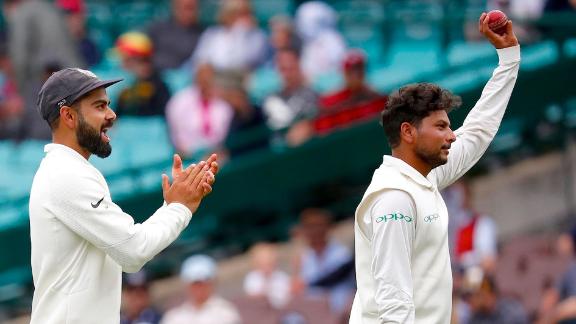Stumps Australia 300 (Harris 79, Kuldeep 5-99) and 0 for 6 trail India 7 for 622 dec. (Pujara 193, Pant 159*, Lyon 4-178) by 316 runs
After rain took away three hours, India nipped out three lower order wickets when play resumed on the fourth day in Sydney. Then, the last-wicket pair of Mitchell Starc and Josh Hazlewood held on for an hour before wristspinner Kuldeep Yadav, playing his first Test of the tour, and only his sixth overall, picked his second five-for by removing a stodgy Hazlewood, who could have been out much earlier had Hanuma Vihari held a top-edged slog sweep at midwicket. India quickly enforced the follow-on, Australia's first at home in 31 years after securing a 322-run lead.
Suddenly, the time lost to rain seemed irrelevant. Then, with four minutes before the scheduled tea interval, Jasprit Bumrah bowled a lifter that rapped Marcus Harris on the glove, with all eight light towers at the SCG burning. The blow was partly because Harris misjudged the length and looked to duck away by taking his eyes off the ball.
A strong Sunday crowd that had paid good money expected a proper contest were left annoyed, much like Virat Kohli, when they saw the umpires converge to pull out the light meter and the players walked off. Sadly - or much to the relief of the Australian team - they did not return, leaving everyone debating the whys and wherefores of the cricket's playing conditions.
The big picture, however, was the situation left Australia only slightly better than the position they had been in at the start of the day.
India's first-ever series win in Australia is all but sealed. Kohli can lay his hands on the Border-Gavaskar Trophy, but he will be aching for a 3-1 scoreline. For that, India would need 10 wickets on the final day, but with a forecast similar to Saturday's and the rule book that calls for play to stop at the slightest hint of rain or play to hinge on a light reading - despite having quality, state-of-the-art floodlights - it seems possible the Sydney Test could end in a draw.
The delay at the start of play may have made Kohli's decision to enforce the follow-on straightforward. With time running out and 14 wickets still to take, he threw the ball to Mohammed Shami and he struck off the third delivery. Pat Cummins, who had shown admirable fight both against pace and spin, got a grubber that beat the bottom to crash into the stumps.
Peter Handscomb saw this as an opportunity to score runs and showed authority against Kuldeep, first by sweeping him off a length and then playing a finely-timed short arm jab to the midwicket boundary. At the other end, Shami was properly banging the ball into the pitch and getting it to respond. Handscomb was jumping back into his crease, expecting balls to rear up, only for it to sneak low. This is how he would fall eventually, but to Jasprit Bumrah, who used the age-old tactic of short-short and slightly-full to get his man. Handscomb, playing back to a length ball, only managed to chop on, the ball keeping a touch low again. The lower order was exposed to India's pace pack under cloudy skies.
Kohli quickly brought on his spinners, a move to keep his fast bowlers fresh for when he would eventually enforce the follow on. Kuldeep had a fourth when Lyon was out sweeping to a full toss that drifted away and struck him on the boot, possibly outside the line. Australia had two full reviews, but Lyon saw Starc non-committal in asking him to refer. Lyon obediently walked off. In the commentary box, Ricky Ponting was furious, terming Australia's move 'slack and not desperate enough.'
The last-wicket pair then had some fun, making India chase deliveries to the boundary through slogs - some well-timed, others miscued - on a slow outfield, where the ball often pulled up short of the boundaries. They batted out 14 overs for 42 before Kuldeep came on to get Hazlewood with a wrong'un.
Australia's openers then had to bat out a mere four overs in the second innings before they went off and spent a better part of a farcical day in the change room even as a frustrated Sunday crowd disapproved of ICC's rigidity with the rules by switching on the backlights of their mobile phones, as if to say 'you want more light? Here, take this.' Unfortunately, they know it would've only fallen on deaf ears.



